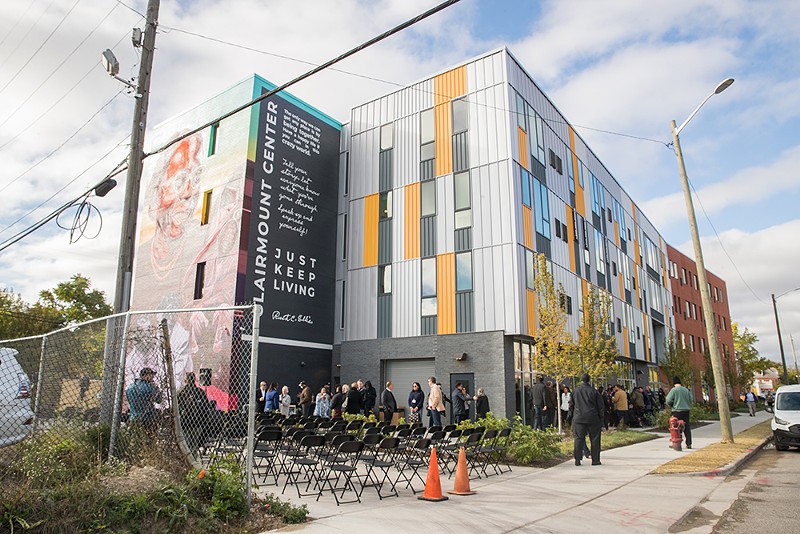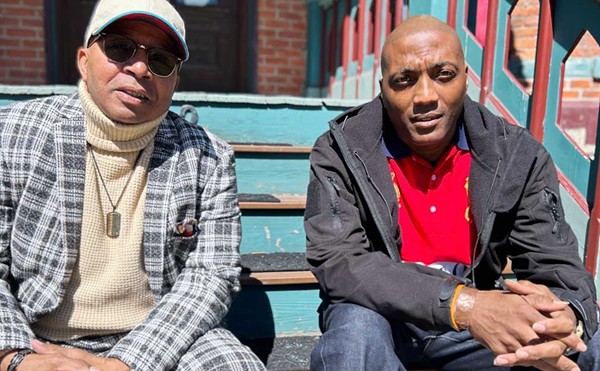
Flickr Creative Commons, City of Detroit
The Ruth Ellis Clairmount Center for LGBTQ+ youth at 61 Clairmount St.
The city of Detroit on Friday unveiled the new $16 million Ruth Ellis Clairmount Center for LGBTQ+ youth.
The 43-unit, 45,540-square-foot development features housing, counseling, and a community health and wellness center at 61 Clairmount St. in the city’s Piety Hill neighborhood.
City officials said the center is the first of its kind in the Midwest.
“Our city must do everything it can to not only help the most vulnerable members of our community and to create safe spaces where everyone is welcome,” Mayor Mike Duggan said at a news conference. “This administration will continue to not only create more affordable and supportive housing, but also expand our policies and strengthen our connection with the LGBTQ+ community to build a stronger city that all of us are proud to call home.”
The center includes 32 studio and 11 one-bedroom apartments, 34 of which will be covered by vouchers to pay for housing expenses. An additional eight apartments are considered “low cost” for residents earning no more than 30% of the area median income. A peer support specialist will live in one of the units.
The center features a resource library and technology hub, a career training and event space, a roof deck, art studio, private patio, raised beds for gardening, and a space dedicated to support services such as therapy and case management.
Private care providers and addiction and mental health counselors will also be on hand.
At the 2,000-square-foot Ruth Ellis Health & Wellness Center, LGBTQ+ youth will have access to primary care, comprehensive sexual health services, PrEP, HIV treatment, gender-affirming hormone therapies, and other critical services.
“The new Ruth Ellis Clairmount Center is a significant milestone for Ruth Ellis Center, and more importantly, an example of how we must respond to the disproportionate number of LGBTQ+ young people experiencing homelessness nationwide,” said Mark Erwin, interim co-executive director of the Ruth Ellis Center. “Our mission is to create opportunities with LGBTQ+ young people to build their vision for a positive future.”
The center is named in honor of an LGBTQ+ activist from Detroit who, beginning in the 1930s, offered shelter and support “to those whose race, sexual orientation or both set them apart from the dominant culture,” the center says.
Up to 40% of the nation’s unhoused youth identify as LGBTQ+, largely because of discrimination and rejection by their families, according to the Williams Institute. Nearly 25% of Black men who are between 18 and 35 and identify as LGBTQ+ have been homeless in the previous year.
LGBTQ+ youth are also disproportionately at risk of being the victim of violent crimes.
“The reason this facility is so important is not just because we need more permanent supportive housing, not just because affordable housing is an issue, but because when you are an LGBTQ youth, the likelihood that you are murdered is really high,” said state Sen. Adam Hollier, D-Detroit. “And creating spaces like this provide you with not only a place to stay and live, but a place with the kind of programing and support services to make sure you can live a life that you are proud of, that you are happy with, and it’s critically important.”
The center is graced with a large, colorful mural of Ellis proudly smiling over Woodward Avenue.
Despite the recent inroads in protecting LGBTQ+ residents, many of them still face “discrimination, bias, and hate,” said John R. Johnson Jr, executive director of the Michigan Department of Civil Rights.
“That is precisely why the Ruth Ellis Center and this new Claimount Center facility is so important — connecting affordable, livable housing with the kind of services marginalized communities often need to build better, more productive, and more equitable lives," Johnson said. "It’s the kind of forward-looking effort that connects important public policy to the practical needs of real people.”
Stay connected with Detroit Metro Times. Subscribe to our newsletters, and follow us on Google News, Apple News, Twitter, Facebook, Instagram, Reddit, or TikTok.






